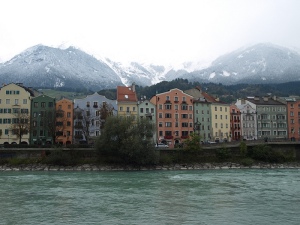 A workshop entitled “Legal Translation: Challenges in Theory and Practice” is to be held in Innsbruck, Austria from 30th October to 1st November 2014.
A workshop entitled “Legal Translation: Challenges in Theory and Practice” is to be held in Innsbruck, Austria from 30th October to 1st November 2014.
It is one of three workshops forming TRANSLATA II, the 2nd International Conference on Translation and Interpreting Studies.
TRANSLATA is conceptualized as a forum for basic research in translatology, whose aim it is to refocus on translation proper (= professional translation and interpreting) as the core object of study. In this age of constant paradigmatic changes, research in Translation Studies has tended to deal with anything but translation. Accordingly, TRANSLATA – openness to interdisciplinary perspectives notwithstanding – seeks to retrieve translation proper as the main object of study within Translation Studies.
TRANSLATA is an emphatically multilingual event: rather than subscribing to the uniformity of “English only” gatherings, this conference is open to a wide variety of working languages and presentations.
By organising the TRANSLATA II, entitled “Translation in Theory and Practice”, the Department of Translation Studies at the University of Innsbruck wishes to offer all those who deal with translation theoretically, practically, didactically and commercially a shared forum for exchange on the following questions and problems:
- New developments regarding the practice of translation and its markets
- What are the main challenges and problems that arise from these new developments?
- Should translation theory take account of the practice of translation at all? What is the actual relationship between theory and practice?
- The ALPAC report and the present-day increasing use of machine translation
- The role of new information and communication technologies and digital humanities in Translation Studies and translation practice
- Has translator and interpreter training missed the boat on the digital age?
- What characterises the development of Translation Studies in recent decades?
- What are the core questions, main concepts and the object of study in Translation Studies?
- Translation quality and its definition within the triad of translation practice – translation theory – translation quality
- How can the core subject of Translation Studies, i.e. translation, be defined? What role does equivalence play in this context?
- Differences and similarities between different types of translation
- New approaches and so-called paradigmatic shifts in Translation Studies
- What role does interdisciplinarity play in Translation Studies?
- Which disciplines are the main (inter)disciplinary allies of Translation Studies?
- Are linguistics-based Translation Studies outdated? If so, why?
Apart from parallel sessions, TRANSLATA II also hosts three workshops, for which separate Calls for Participation are available:
1. And yet it translates! Human-Machine Interaction in Translation in the 21st Century
2. Legal Translation: Challenges in Theory and Practice
3. Translating Humo(u)r
Legal Translation – a Challenge to Translation Theory and Translation Practice Workshop – Call for Participation
Everyone has the rights to be informed promptly and in detail in a language which he/she understands about the nature and cause of the accusation against him/her (European Convention on Human Rights).
With the Directive 2010/64/EU of the European Parliament and the Council of 20 October 2010 on the right to interpretation and translation in criminal proceedings and the Directive 2012/13/EU of 22 May 2012 on the right to information in criminal proceedings the first two acts concerning the introduction of common fundamental rights in the EU member countries have been presented. Both directives are expected more or less to rub off on the translation and interpreting services provided in police departments or in courts.
The Directive 2010/64/EU emphasises the need for high quality translation and interpreting services in hearings and criminal proceedings so as to safeguard the fair treatment of foreigners ignorant of the national language before police and court authorities.
Although translators and interpreters in criminal proceedings should be able to safeguard translation and interpreting services of uncompromising quality, this is not always the case. Translation and interpreting in hearings and courts is handled differently not only internationally but also within the same jurisdiction. The use of laypersons or the cheapest alternatives force both authorities and foreigners to make crucial decisions on the basis of poor translation and interpreting services.
The organizers welcome proposals addressing the following topics (but do not rule out other more general proposals):
- Strength and weakness of the Directives
- The transposition of the Directives 2010/64/EU und 2012/13/EU in the Member States
- Professional changes associated with the transposition of the Directives
- The implications for the transposition for the training and assessment of legal translators and court interpreters
- Good practices associated with the Directives.
Proposals should be sent to legaltranslation@translata.info by 30th June 2014. Notification of paper acceptance will be sent by 31st July 2014. Acceptance of your submitted contribution entails automatic registration for the TRANSLATA II conference and conference fees apply.
Workshop organizer:
Stefanos Vlachopoulos (Technological Educational Institute of Epirus)
 Disclaimer: The above does not contain all details of the conference and is an edited version, provided as a heads-up only. Please refer to the conference website for all information about TRANSLATA II and the legal translation workshop.
Disclaimer: The above does not contain all details of the conference and is an edited version, provided as a heads-up only. Please refer to the conference website for all information about TRANSLATA II and the legal translation workshop.